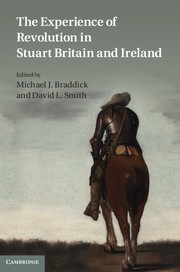Book contents
- Frontmatter
- Contents
- Notes on contributors
- Preface
- List of abbreviations
- JSM
- Introduction: John Morrill and the experience of revolution
- 1 The Scottish–English–Romish Book: the character of the Scottish Prayer Book of 1637
- 2 Popery in perfection? The experience of Catholicism: Henrietta Maria between private practice and public discourse
- 3 Sir Benjamin Rudyerd and England's ‘wars of religion’
- 4 Rhetoric and reality: images of Parliament as Great Council
- 5 Cathedrals and the British Revolution
- 6 History, liberty, reformation and the cause: Parliamentarian military and ideological escalation in 1643
- 7 Sacrilege and compromise: court divines and the king's conscience, 1642–1649
- 8 Law, liberty, and the English Civil War: John Lilburne's prison experience, the Levellers and freedom
- 9 On shaky ground: Quakers, Puritans, possession and high spirits
- 10 James Harrington's prescription for healing and settling
- 11 ‘The Great Trappaner of England’: Thomas Violet, Jews and crypto-Jews during the English Revolution and at the Restoration
- 12 The Cromwellian legacy of William Penn
- 13 Irish bishops, their biographers and the experience of revolution, 1656–1686
- 14 Religion and civil society: the place of the English Revolution in the development of political thought
- Bibliography of the major writings of John Morrill, 1967–2009
- Index
- References
Introduction: John Morrill and the experience of revolution
Published online by Cambridge University Press: 05 August 2011
- Frontmatter
- Contents
- Notes on contributors
- Preface
- List of abbreviations
- JSM
- Introduction: John Morrill and the experience of revolution
- 1 The Scottish–English–Romish Book: the character of the Scottish Prayer Book of 1637
- 2 Popery in perfection? The experience of Catholicism: Henrietta Maria between private practice and public discourse
- 3 Sir Benjamin Rudyerd and England's ‘wars of religion’
- 4 Rhetoric and reality: images of Parliament as Great Council
- 5 Cathedrals and the British Revolution
- 6 History, liberty, reformation and the cause: Parliamentarian military and ideological escalation in 1643
- 7 Sacrilege and compromise: court divines and the king's conscience, 1642–1649
- 8 Law, liberty, and the English Civil War: John Lilburne's prison experience, the Levellers and freedom
- 9 On shaky ground: Quakers, Puritans, possession and high spirits
- 10 James Harrington's prescription for healing and settling
- 11 ‘The Great Trappaner of England’: Thomas Violet, Jews and crypto-Jews during the English Revolution and at the Restoration
- 12 The Cromwellian legacy of William Penn
- 13 Irish bishops, their biographers and the experience of revolution, 1656–1686
- 14 Religion and civil society: the place of the English Revolution in the development of political thought
- Bibliography of the major writings of John Morrill, 1967–2009
- Index
- References
Summary
When John Morrill began his research career the most influential writing about mid-seventeenth-century England was essentially concerned with modernization, and, even in non-Marxist explanations, contained a strong strain of materialism. This was a prominent feature of the sometimes vituperative exchanges of the gentry debate, and John's first piece of extended writing about seventeenth-century England was written in response to that controversy; it was a long essay, composed during a summer vacation, which examined the relationship between the fortunes of particular gentry families and their Civil War allegiance. His interest in local realities, however, quickly gave rise to dissatisfaction with the broad categories of analysis with which the gentry controversy was engaged. By the time that he published the monograph based on his Oxford D.Phil. thesis, in 1974, he concluded (among other things) that ‘the particular situation in Cheshire diffracted the conflicts between King and Parliament into an individual and specific pattern. As a result all rigid, generalized explanations, particularly of the socio-economic kind, are unhelpful if not downright misleading.’ A desire to do better than these generalizations has driven his work ever since, and has thereby provided a huge stimulus to scholars of early modern England.
His doctoral study of Cheshire marked the beginning of the first of three overlapping but distinct phases in the development of his work, in each of which he has been a leading figure.
- Type
- Chapter
- Information
- Publisher: Cambridge University PressPrint publication year: 2011



